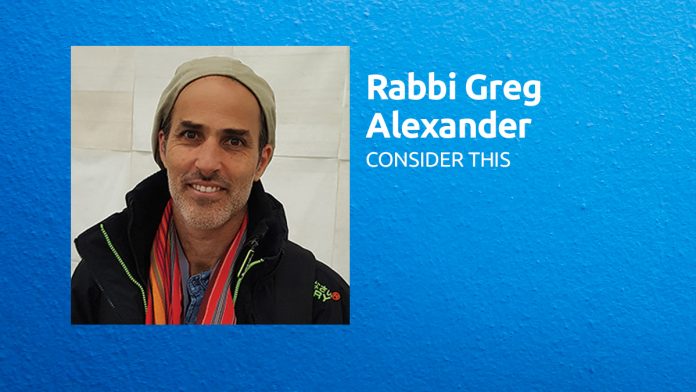By Rabbi Greg Alexander (he/him/his)*
There are two classical Jewish texts that I love and live by, but put next to each other prove to be a challenging paradox.
The first is part of the Aleinu prayer that we recite at the end of every service. We call out to the Eternal Sovereign to soon see the time that we can l’takein Olam b’malchut Shaddai — repair the world under Her rule. This is one of the original sources for the idea of Tikkun Olam — the Jewish responsibility for fixing the world around us. And there is so much to fix.
I often write about the physical and spiritual need that we all have for Shabbat, a day in the week to rest and restore our souls and celebrate what is good around us; but without the other six days of work, Shabbat would have no meaning at all. For the rest of the week, we are doing the labour we need to do to create nothing less than a perfected world. Then we can rest!
Why would G-d not have just created a perfect world in the first place and saved us the trouble? Well, I am not G@d, but our teachings explain that we are to be partners in the work of fixing the world. You know how different it is to walk into a shul that you have never set foot in and while you appreciate the glass windows and the high ceilings, it is still nothing like walking into your shul, that your grandparents helped build and you had your B-mitzvah there and your kids go to the BimBam Shabbat tots service and you sit on this committee and that group. It is not perfect, not by any means, and sometimes helping to fix it leaves you tearing your hair out, but you feel responsible for it, you share its joys and sorrows and it’s your community. Perhaps that is what G#d wants from us too.
The second text is a well-known mishnah from Pirkei Avot, the treasure trove of wisdom from the rabbis of 2000 years ago. In it, the sage Ben Zoma, who lived and taught at the same time as Rabbi Akiva after the destruction of the Second Temple, asks short existential questions like “who is wise, who is mighty, who is honoured?” and each time responds with a short pithy answer and a verse of Torah. When he gets to the question eizehu ashir “who is rich?” he responds, ha-sameach b’chelko “the one who rejoices in their portion,” and adds the verse from Psalms, as it is said, “You shall enjoy the fruit of your labours, you shall be happy and you shall prosper” (Ps. 128:2).
What a powerful statement of how to find true happiness. If we are always chasing after the new car, the better job, the perfect family, we are doomed to be eternally frustrated. Looking around at what we have, and being grateful for that is a far more powerful way of attaining happiness.
Now here lies the paradox. If we are happy with what we have, why would we be called to fix it? So, I am unfit and unhealthy, I hate my job, my roof is leaking and… Be happy with your portion! If we are called to be satisfied with what we have, why would we ever seek to better it?
The answer lies in balance and potential. Balance between celebrating what we have and trying to better our lives to achieve our potential. If we spend our time unhappy with our lives because of unfulfilled dreams, or bitter memories, we become embittered and unable to be sameach, happy with what we already have. On the other hand, if we are not trying to fix ourselves and the world around us, we will also not be happy because we have not found the best way to be.
A good guide is to look at what we need against what we desire or crave.
Shlomo Ibn Gabirol, the 11th Century poet-philosopher said, “When we seek more than we need, we hinder ourselves from enjoying what we have. Seek what you need and give up what you need not. For in giving up what you don’t need, you’ll earn what you really do need.” (Mivhar Hapeninim, 155, 161)
What we really need is to be the best people we can be in the best community we can live and that takes work, hard work. But as we continually strive for better, for fulfilling our greatest potential, we need to stop, look around and be thankful for what we have.
- https://uwm.edu/lgbtrc/support/gender-pronouns/
Temple Israel www.templeisrael.co.za
Published in the PDF edition of the Pesach/April 2022 issue – Click here to get it.
• To advertise in the Cape Jewish Chronicle and on this website – contact Karyn on 021 464 6700 ext. 104 or email advertising@ctjc.co.za. For more information and advertising rate card click here.
• Sign up for our newsletter and never miss another issue.
• Please support the Cape Jewish Chronicle with a voluntary Subscription for 2022. For payment info click here.
• Visit our Portal to the Jewish Community to see a list of all the Jewish organisations in Cape Town with links to their websites.
Follow the Chronicle: Facebook | Instagram | Twitter | LinkedIn











